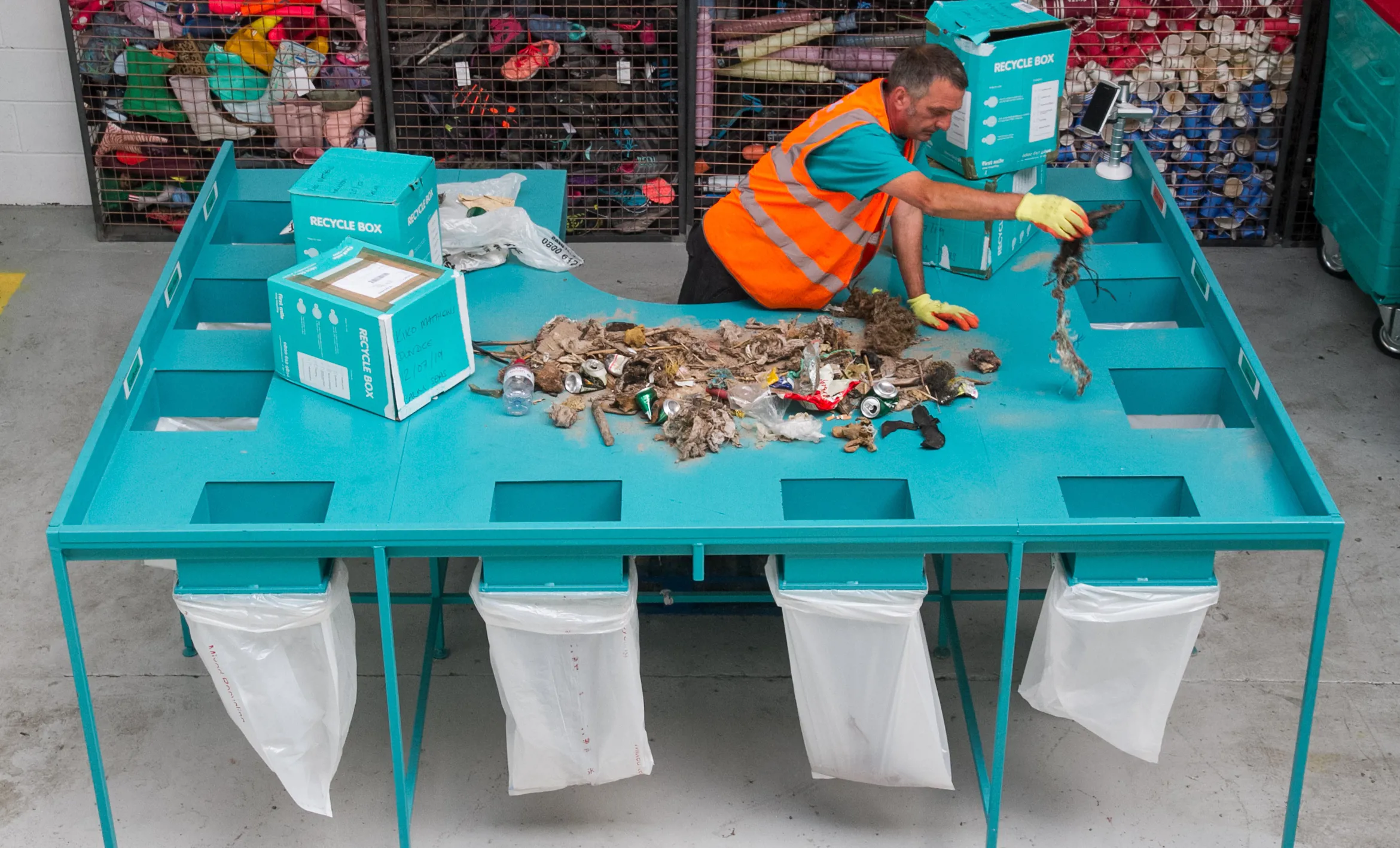Despite a surge in consumer awareness of the impact of plastic pollution, plastic - much of which is recyclable - is dominating the litter found on our nation’s coast, according to the analysis of beach waste collected from around the UK in the Kik-Plastic Challenge.
The Kik-Plastic Challenge saw Kiko Matthews cycle-trek 7200km around the UK’s coastline between 5th May and 29th July 2019 to raise awareness of plastic pollution. As part of the challenge, Kiko and a team of volunteers carried out 78 community beach cleans, with First Mile providing two of its flagship RecycleBoxes at each location.
These boxes were filled with beach litter and sent back to First Mile’s innovative RecycleLab for analysis and data collection. Here, each box was emptied out onto First Mile’s bespoke audit table in the RecycleLab, where its contents were sorted into different material types, which were then weighed and identified as either recyclable or non-recyclable.
A total of 3,436kg of beach litter was collected across the 79 beaches by nearly 2,000 volunteers, the same weight as 20 male giant pandas. Of this, 859kg was materials that are commonly and easily recycled such as glass bottles, aluminium cans and plastic bottles.
Plastic bottles, tubs and cups were the most common recyclable items found during the beach cleans, accounting for 515kg or 60% of the rubbish collected that could have been recycled. Cans came in second, at 24%, followed by glass and paper at 9% and 7% respectively.
For non-recyclable waste, the worst culprit was fishing industry waste, including nets and ropes, found on 48 of the 79 beaches. Flexible plastics – items such as plastic bags, food & confectionary wrappers and crisp packets – also accounted for a significant amount of non-recyclable litter.
Geographically, results showed that the south and south-west coast were beaches where the least litter was collected, with Minehead having the least at 1.5kg. It should be noted that each beach clean had a varying number of volunteers which may have affected how much rubbish could be collected from each beach. However, waste collected per volunteer rates were still lowest along the south and south-west coast, with Budleigh Salterton boasting only 0.08kg of waste collected per volunteer.
In general, it was east and south-east beaches, along with Wales, that mainly suffered from day-tripper litter, such as food and drinks packaging, nappies and disposable coffee cups. Other common problematic items found were wet wipes, clothing and shoes, plastic toys, tissues and napkins and cigarette butts. In Edinburgh alone, a massive 120kg of wet wipes were collected.
The worst beach in the UK was found to be Magilligan Point in Northern Ireland, where over 250kg of beach waste was collected by just 12 volunteers, approximately 85% of which was fishing industry debris, such as ropes, nets and plastic containers. Although Scourie More in Scotland did not hit the top spot for the most waste collected, it was estimated that approximately 15 tonnes of waste, mainly from the fishing industry, lay on this beach. However, due to the remote location and the small number of volunteers, the team was only able to collect 112kg of waste.
Beaches in the north and west coast of Scotland and the Outer Hebrides also suffered significantly from fishing industry waste, accounting for around 70% of beach waste collected, as well as large waste items, which are presumed to have washed ashore, including a fridge door, plastic container drums, tyres and a toilet seat.
Microplastics were found on almost every beach, but were abundant at North Queensferry, Southend-on-Sea, Fulham, Croyde, Whitesands and Rhosneigr. Huge amounts of plastic nurdles, commonly used in plastic product manufacturing, were also found at North Queensferry.
Speaking about the findings, First Mile’s founder and CEO Bruce Bratley commented:
“It’s disappointing that the results highlight that there is still much to be done around educating beach-goers and businesses about the impact that their actions have on our environment. Our beaches should be admired and respected for their natural beauty and contribution to our ecosystems, not viewed as a dumping ground for litter and commercial waste.
“Local authorities need to play their part in making it easy for people visiting beaches to recycle as much as possible and should continually review their facilities to ensure they’re fit for purpose. An example could be the introduction of coffee cup recycling bins, or mixed recycling bins that are effectively sorted when collected.”
Kiko Matthews added:
“It was such an eye-opening challenge. Every beach had waste on it, some more than others; some beaches had only ocean-dumped waste and others saw mostly waste from beach-goers. The worst beach had about 15 tonnes of waste on it as a result of both its remoteness and the fishing industry. It has been so great to have this data from First Mile.”
Looking to the future, First Mile hopes to work with more individuals or groups planning beach cleans, supplying RecycleBoxes for the return of samples to add to its interactive map, helping to build a wider picture of beach waste in the UK.
Each beach was cleaned for approximately two hours, with varying numbers of volunteers present at each location.



